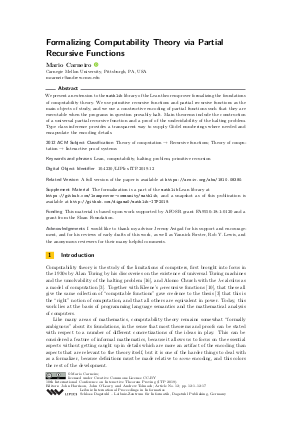@InProceedings{carneiro:LIPIcs.ITP.2019.12,
author = {Carneiro, Mario},
title = {{Formalizing Computability Theory via Partial Recursive Functions}},
booktitle = {10th International Conference on Interactive Theorem Proving (ITP 2019)},
pages = {12:1--12:17},
series = {Leibniz International Proceedings in Informatics (LIPIcs)},
ISBN = {978-3-95977-122-1},
ISSN = {1868-8969},
year = {2019},
volume = {141},
editor = {Harrison, John and O'Leary, John and Tolmach, Andrew},
publisher = {Schloss Dagstuhl -- Leibniz-Zentrum f{\"u}r Informatik},
address = {Dagstuhl, Germany},
URL = {https://drops.dagstuhl.de/entities/document/10.4230/LIPIcs.ITP.2019.12},
URN = {urn:nbn:de:0030-drops-110671},
doi = {10.4230/LIPIcs.ITP.2019.12},
annote = {Keywords: Lean, computability, halting problem, primitive recursion}
}

 Creative Commons Attribution 3.0 Unported license
Creative Commons Attribution 3.0 Unported license

















